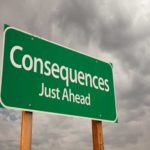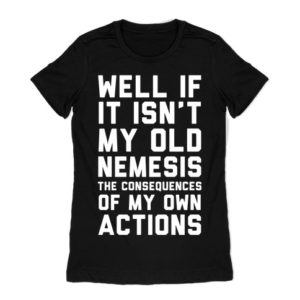 I can still recall my dad admonishing me that my actions (and, indeed, anyone’s) were always associated with consequences.
I can still recall my dad admonishing me that my actions (and, indeed, anyone’s) were always associated with consequences.
I left my bike outside one night and it was missing the next morning. It was recovered by the local police—I still think it was a lesson my Dad arranged—but I did operate differently after that.
I let a friend drive my Dad’s car and he managed to kiss a tree with it. I became a body-work guy and drained my bank account after finding and buying the replacement fender.
My life was, and still is, a series of outcomes measured in relationship to what I did to yield the outcomes.
Now sometimes I am totally conscious about the choice I’m making; other times I’m simply operating on auto-pilot. And this is where my challenges occur.
Do I actually choose to respond to the criticism of my blog? Or do I reactively defend my position? Do I see the aggressive driver as a competitor or do I not let them have that place in line?
I’ve had clients who’ve claimed to have “difficult” relations with some of their associates (both direct reports and managers). This isn’t much of a problem until and unless it causes performance issues (as exposed in periodic reviews or when called on the carpet for how these relations affected the work of the team). Others have recounted challenges with social or sporting comrades or even family members.
To explore these difficulties, I’d like to recognize that whatever dysfunction there is between two people, it is a consequence of actions taken by both parties. Correct? Since in all the cases mentioned above I haven’t had any interaction with the other party, I’m left coaching my client who wants to change the outcomes of these “transactions” (verbal/behavioral interactions) between two people.
In my experience “difficult” relationships are the product of repeated, sometimes patterned transactions. In family counselling, it’s frequently referred to as “pushing buttons.” The initiator of a good knock-down, drag-out fight in the family living room is often the one who knows how to push the other’s buttons.
The fuel for the explosion is the programmed Knower/Judger (K/J) reactions of the combatants once the button is pushed.
It seems that neither participant in this transaction has control over what happens; it’s left to the “consequence” of the actions they take on autopilot. That’s why just about every time they get into it, it sounds the same, looks the same, and ends the same. And both sides realize this is pretty dysfunctional.
Want to change the outcome? Develop a different consequence! How can I develop a different consequence? Take a different action. One that does not come from my need to defend my position, be right, or dominate because I’m his manager (or parent). One that is NOT the one I always reach for. And one that does not come from my programmed K/J reactions.
What would that action be?
Well, just about anything! That’s right! Respond to the “button push” with anything not normally said and watch the conversation go to places it’s never gone before. Why? Because the other party will have no idea how to respond. (In other words, you didn’t play your part!) You disrupted the dysfunctional pattern, and you did it ON PURPOSE. You made the decision to alter your action to produce a different consequence.
And the funny part is that I really mean try “anything.” Tell the person who you know is dead-wrong and who you want to correct that he is right!
I once counseled a dad who was less than enthusiastic about his beautiful daughter’s boyfriend. Boyfriend could push Dad’s buttons and provoke Dad to bite hook, line, and sinker and engage the young man in transactions that caused dysfunction across the family.
Daughter, knowing she was poking for a fight, asked Dad if Boyfriend could go on the family weekend to the lake. Well, of course, Dad had no interest in this and was prepared to say no and guarantee that Daughter remained mad at Dad.
So I coached Dad to try something different. He agreed to let Boyfriend come along on the family weekend. To his credit, Dad kept his cool (a different approach he tried all weekend long, at every opportunity). Boyfriend kept pushing Dad’s buttons, but Dad wouldn’t bite. Daughter finally saw the nature of the young man, and the whole game ended within a week. WIN!
Actions have consequences. Keep doing the same actions and I can simply expect to see the same consequences. Once I understand that there’s POWER in the ability to choose a different action from the reactionary K/J reaction, I can cancel the ongoing dysfunctional consequence.


